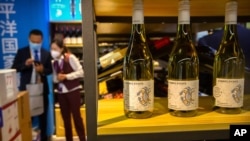Australia is asking the World Trade Organization to intervene in its dispute with China over the imposition of anti-dumping duties on Australian wine exports.
Relations between Australia and China, its biggest trading partner, are at their worst in decades. There has been diplomatic friction over regional geopolitical flashpoints, including Beijing’s growing military ambitions in the South China Sea. Tensions escalated last year when Australia demanded an inquiry into the origins of the new coronavirus, which was first detected in China in late 2019. It was a move that infuriated Beijing, where it was interpreted as criticism of its handling of the pandemic.
Since then, China has imposed tough economic sanctions on a range of Australian commodities.
Beijing accused Australia of illegally subsidizing its wine producers, and in November announced additional import taxes of more than 200% on Australian wine for five years.
China was Australia’s most valuable wine export market, but the duties have almost killed off that lucrative trade. Australian officials have denied the wine industry has been subsidized, as China has alleged.
Australia's ambassador in Beijing said China’s campaign of economic punishment against his country was “vindictive.”
Prime Minister Scott Morrison also warned that his government would respond to “economic coercion.”
Canberra has said it will now appeal China’s tariffs on wine exports to the World Trade Organization.
“In March this year the Chinese government put countervailing duties on Australian wine ranging between 116% to 220%,” said Australian trade minister Dan Tehan. “That has had a serious impact on the Australian wine industry. Our exports have fallen from 1.1 billion [Australian] dollars to approximately $20 million. As a result, and following close consultation with the Australian wine industry, and I thank them for the cooperative way they have worked with the government, we have decided to take this wine dispute to the World Trade Organization.”
The action came just days after a summit of the G-7 grouping of advanced economies echoed Australia's call for a tougher stand against China's trade practices.
It is the second time in six months Canberra has called in the WTO. The first was after China applied tariffs to Australian barley exports.
The WTO resolution process involves lengthy consultations and possible adjudication.
Analysts warn that the WTO is unlikely to reach a conclusion regarding the contentious wine tariffs for some years.




